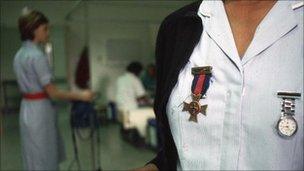Concerns grow over impact of push for savings in NHS
- Published

Nurses say quality of care is suffering
There is growing evidence that pressure to save money in the NHS in England is affecting the quality and safety of care, nurses' leaders say.
The warning from the Royal College of Nursing (RCN) comes as the Patients Association says more people are being forced to wait in pain for operations.
Both say that staffing cuts mean patients are suffering and the situation is getting worse.
But the Department of Health says there are no grounds to suggest that the quality of care is slipping.
The NHS in England has to find £20bn of efficiency savings over the next four years, meet the needs of an ageing population, and transform the way it is run.
Many NHS managers say the most immediate worry is the push for savings while trying to protect the quality of care.
Ministers say this is about doing things better in order to reinvest in front-line services. But the message from many health workers is that patients are paying the price, often because of staff shortages.
Longer waits
A healthcare assistant at one A&E unit, who did not wish to be named, said staff were stressed and tired.
"At the end of the day we try to do the best we can and they probably will pick up on the fact that we are short (staffed). They are waiting longer for painkillers, waiting longer to be assessed."
A diabetes ward nurse, who again did not want to be named, told the BBC staff shortages were putting safety at risk, because of mistakes in medication.
"A lot of drugs have similar sounding names or look similar. So you have to be careful all the time. So whereas you used to take a bit of time, speak to the patient - and they usually know what they're on anyway - but obviously because you're rushing you haven't got time to speak to the patient properly and find out."
The need to communicate is particularly important in mental health. A nurse from north-east England said a failure to fill posts had made it harder to build trust.
"You're looking after someone who is possibly suicidal or dangerous to themselves or to others - you need to build a relationship with them, and if they're having different people looking after them during the course of a shift they may not say what they're thinking because they haven't got that relationship with that nurse."
Dr Peter Carter, general secretary of the RCN, said: "These examples are just a snapshot of what nurses and healthcare assistants are telling us about how the cuts are affecting frontline patient care. The idea that quality and waiting times can be maintained in the face of these cuts is just plain wrong."
That view is backed by the Patients Association which asked NHS hospitals for data on operations for 2009 and 2010. Just one in three responded to the freedom of information request, but the findings suggest they are carrying out fewer procedures with longer waiting times.
A spokesman, Dr Mike Smith, said patients and health workers were reporting increasing problems on their helpline.
"It is sometimes heartrending when they tell us what is happening to them or their near and dear - particularly in the elderly group. The number of patients per nurse has been going up, and if you don't have nurses you don't get good care. That's why we hear so many horror stories."
The Department of Health says that according to official data the overall number of hip and knee replacements and cataract operations rose between April and October last year, compared with 2009.
A spokesman said: "There is no justification for asserting that quality of care is slipping. Official figures show that the NHS is delivering more for patients and that waiting times are stable."
- Published23 February 2011
- Published17 February 2011